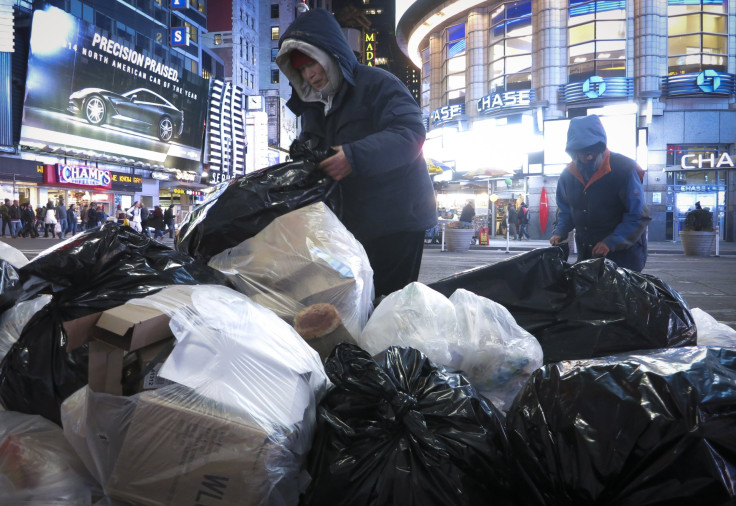New York City To Reduce Waste By 90% By 2030 With New Waste Management Program: De Blasio

New York City is set to announce an ambitious new environmental plan on Earth Day that calls for the United States' largest city to slash its waste output by 90 percent by 2030. Mayor Bill de Blasio is set to announce the "Zero Waste" plan at a press event on Wednesday, according to the Associated Press.
The city's plan will reportedly include provisions to reduce waste and overhaul recycling, and also support a plan by the city council to reduce the use of shopping bags. The plan would reportedly be the most sweeping city-level environmental policy overhaul in the Western hemisphere. The Zero Waste plan is part of the city’s PlaNYC initiative, launched by former mayor Michael Bloomberg to address the impacts of population growth and climate change on the city’s infrastructure. De Blasio has kept the elements of the program while rebranding it as OneNYC.
A recent report from Transform Don’t Trash NYC found that the city’s businesses produced over 5.5 million tons of waste a year, putting the actual figure at 2 million tons over official estimates, according to 2012 figures it obtained from an unpublished study. The report also found that 4 million tons of trash was incinerated or sent to a landfill instead of being recycled.
One of the key provisions of the new plan would drastically reduce the city’s garbage exports, where New York sends barges laden with trash to processing facilities in South Carolina, Virginia, New Jersey, Pennsylvania or upstate New York. The new plan would eliminate most of these exports, which reportedly cost the city over $350 million a year.
Official figures show that the city’s waste production has fallen by 14 percent since 2005 as recycling increased, though the Transform Don’t Trash NYC report found the city’s recycling rates were almost half of what PlaNYC called for, with only 24 percent of trash being recycled. The report, citing a 2014 survey of 580 businesses, also criticized the city’s unnecessarily complex policies for discouraging small businesses from recycling.
“Our survey revealed individual blocks in several neighborhoods where collection trucks from 8-10 different hauling companies serviced businesses, and one multi-block commercial strip serviced by 22 different hauling companies. The constant struggle to gain and retain customers leads haulers to operate inefficient routes,” the report said.
Under current regulations, residential buildings have two types of recycling bins, which the new plan calls to simplify into one stream by 2020.
Environmental groups reportedly praised the plan ahead of the announcement. “We see cities all over the world struggling with waste," Michael Berkowitz of 100 Resilient Cities told AP. "A more efficient city is a more resilient city, and that means it's a stronger city."
© Copyright IBTimes 2024. All rights reserved.





















